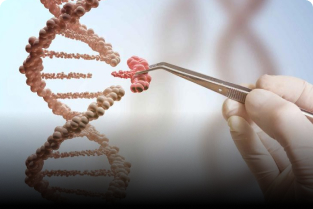In the ever-evolving landscape of science and technology, two fields stand out for their groundbreaking potential: nanotechnology and genetic engineering. Both hold promises to reshape industries, address global challenges, and redefine what’s possible in healthcare, manufacturing, agriculture, and beyond. But will nanotechnology become as pivotal to our future as genetic engineering? Let’s delve into what each field offers and how they compare in shaping the future.
The Promise of Nanotechnology
Nanotechnology operates at an incredibly small scale—manipulating materials at the atomic and molecular levels (1-100 nanometers). Its applications are vast and transformative:
- Healthcare:
- Targeted drug delivery: Nanoparticles can deliver medications directly to diseased cells, reducing side effects.
- Diagnostics: Nanosensors can detect diseases like cancer in their earliest stages.
- Energy:
- Developing more efficient solar panels.
- Enhancing battery performance through nanostructured materials.
- Environmental Impact:
- Nano-filters for clean water.
- Pollution control through nanomaterials that neutralize toxins.
- Manufacturing:
- Stronger, lighter materials for construction and aerospace.
- Revolutionary electronics with smaller, faster, and more efficient components.
The Potential of Genetic Engineering
Genetic engineering focuses on directly modifying an organism’s DNA to alter traits or capabilities. Its applications, already profound, are expanding rapidly:
- Healthcare:
- Gene therapy: Correcting genetic defects to treat diseases like cystic fibrosis or sickle cell anemia.
- CRISPR technology: Editing genes with unparalleled precision to combat hereditary diseases.
- Agriculture:
- Developing drought-resistant and pest-resistant crops.
- Enhancing nutritional value in food.
- Sustainability:
- Producing biofuels from genetically engineered microorganisms.
- Cleaning up environmental pollutants using modified bacteria.
- Ethical Frontiers:
- Possibility of designing “perfect” humans through germline editing, sparking debates on morality and societal impact.
Points of Convergence and Divergence
While nanotechnology and genetic engineering address overlapping domains, their methods and focus diverge. Nanotechnology reshapes materials, while genetic engineering alters life itself. However, their convergence in areas like nanomedicine (e.g., nanobots for cellular repair) and bio-nanotechnology (e.g., nanoscale genetic tools) demonstrates their complementary nature.
Both fields also face challenges:
- Nanotechnology: Scalability, safety concerns, and ethical considerations about unintended environmental consequences.
- Genetic Engineering: Ethical debates, regulation complexities, and long-term impacts on ecosystems.
Which Will Be More Important?
The importance of nanotechnology versus genetic engineering ultimately depends on the context. In healthcare, genetic engineering could revolutionize personalized medicine and gene-based treatments, while nanotechnology will enhance diagnostics and delivery systems. In energy and manufacturing, nanotechnology might outshine genetic engineering due to its ability to transform material science.
However, genetic engineering’s impact on living systems—our bodies, food supply, and ecosystems—has a uniquely profound scope that could redefine life itself.
The Future: A Synergy
Instead of competing, these fields are likely to grow together, creating synergies that maximize their potential. Imagine a future where genetically modified organisms produce nanoscale materials, or nanotechnology-based tools advance gene editing precision.
Conclusion
Nanotechnology and genetic engineering are both indispensable to the future of humanity. While nanotechnology will likely dominate in material science, energy, and electronics, genetic engineering could take precedence in reshaping biology and life sciences. Ultimately, their combined power holds the key to solving the most pressing global challenges, making both equally important in their unique domains.

